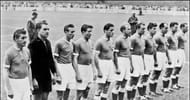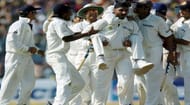Former American goalkeeper and two-time Olympic gold medallist Hope Solo once said: "We all fall; the key is knowing how to rise.”
It’s always hard for people to see or experience downfall; but when one is able to overcome struggles and obstructions, a legacy is often born.
Sport is one such medium where many athletes and teams have recovered from their worst days to reach new heights through hard work, determination and perseverance.
As the COVID-19 pandemic currently grips the world, and everyone has come together in this fight to overcome these days of distress, let us take a look at a few examples in sports where teams or players triumphed against all odds:
1) West Germany beat Hungary 3-2, 1954 FIFA World Cup Final

In the 1954 FIFA World Cup in Switzerland, Hungary were the clear favourites against West Germany in the final, as they were undefeated in four years.
When Hungary faced West Germany in the group stage of the same tournament, the latter were annihilated by an outrageous scoreline of 3-8.
Following Hungary's dominating win in the group stage, no one would have bet a penny in favour of West Germany in the final, especially after Hungary went up two goals to the good after just eight minutes.
Despite all the odds against them, the West Germany team fought back, and by half-time, they were able to level the scores.
In the 84th minute of the game, West Germany took the crucial lead that eventually led them to glory and a place in the history books for one of the best comebacks in football as well as sporting history.
The famous win is known as The Miracle of Bern.
2) India vs Australia, The Test of the Century, Eden Gardens, Kolkata (2001)

In 2001, when Australia toured India, the visitors were regarded as one of the finest cricket teams of all time.
Australia lived up to the hype and defeated India comprehensively by ten wickets in the first Test to extend their winning run to 16 consecutive matches.
In the second Test played at the Eden Gardens in Kolkata, Australia scored 445 runs in the first innings, and in reply India could only muster 171. Trailing by 274 runs, India were forced to follow on by the visiting captain Steve Waugh. Things went from bad to worse for India, as they lost three wickets with only 115 runs on the board.
VVS Laxman had a decent partnership with Sourav Ganguly, and then with Rahul Dravid, he had a record-breaking fifth-wicket partnership of 376 runs. That helped India, who declared at the score of 657, take a lead of 383 runs.
Harbhajan Singh, who clinched seven wickets in the first innings, bagged six wickets in the second as India won the match by a massive margin of 171 runs.
It marked only the third occasion in the history of Test cricket when a team won a Test match after following on.
From personal experience as a sportsperson, I firmly believe that the ability to strive towards an end goal even when things get tough is important. That is because it is the ability of an individual or a team that determines winning or losing – be it in a game or in life.
Even though there isn’t any sure shot way to instill hope in an individual, from what I’ve witnessed as a part of the corporate world, ‘hope’ can be a total game-changer if adopted as an organisation’s culture.
It could be through a combination of a lot of things: leading by example (because only when the leaders feel optimistic and hopeful about solutions – it will trickle down to the lower levels in the organisation). Celebrating the little victories (so that all that has been achieved can truly be valued, and the efforts of everyone can be acknowledged), and planning for contingencies (so that when faced with adversity, one responds to it instead of reacting) also help massively.
In times, when the world is dealing with uncertainties in every possible way – real solutions and strong management is the need of the hour – which, in one word, is ‘hope’.
Helen Keller, an American author and the first deaf/blind person to earn a bachelor’s degree, once said:
“Optimism is the faith that leads to achievement. Nothing can be done without hope and confidence.”
Follow IPL Auction 2025 Live Updates, News & Biddings at Sportskeeda. Get the fastest updates on Mega-Auction and cricket news
